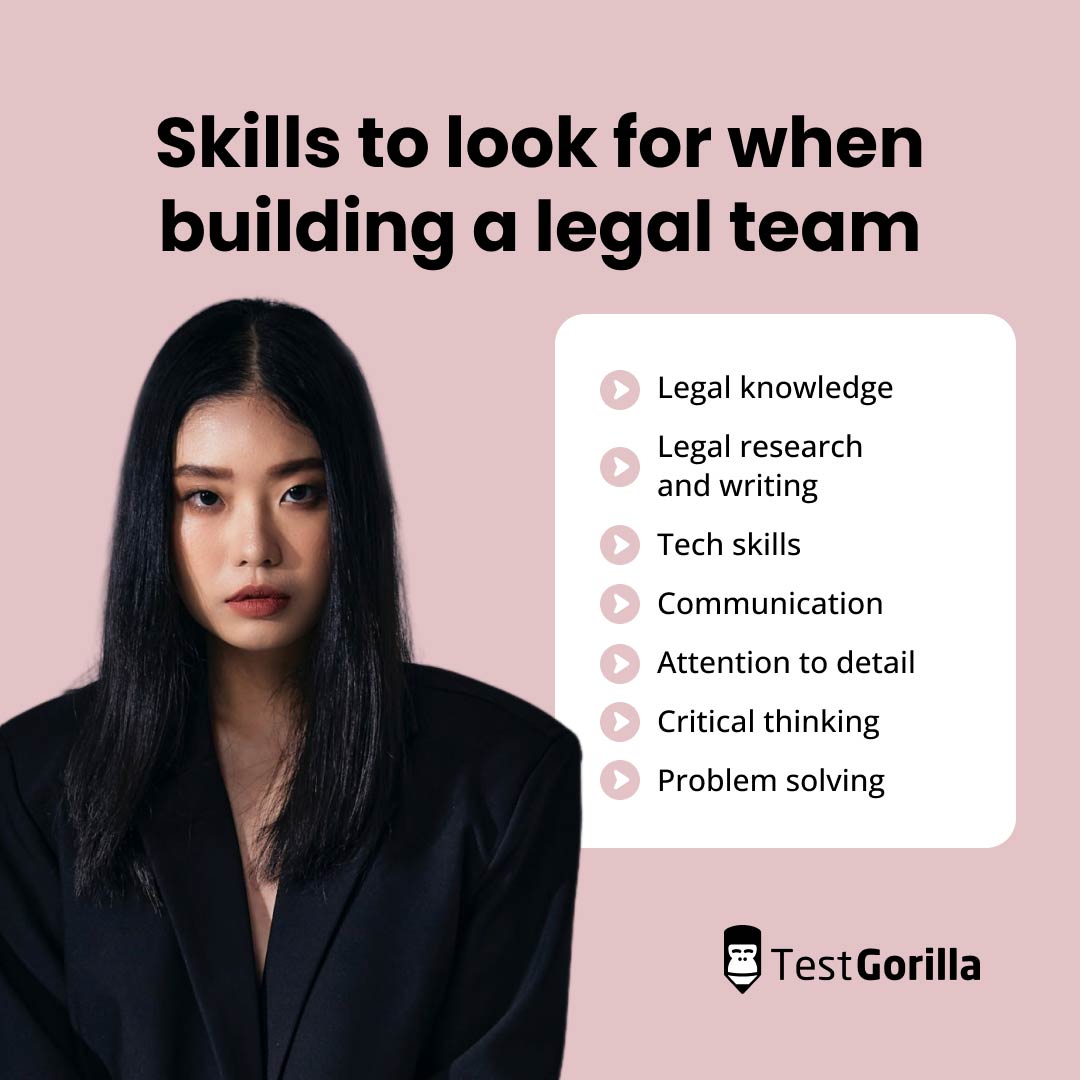Hiring an attorney is an investment in your company’s future – they’ll protect your business’ interests and make sure you’re adhering to rules and regulations. You need to make sure they’re reliable and trustworthy – and they must be a good fit for your organizational culture, too.
You can’t compromise with any of these.
Now think about all the complexities you need to consider if you need to hire an entire legal team.
If you’ve already calculated your cost per hire, you know that hiring a new employee is quite expensive. On top of this, a single hiring mistake can cost you thousands of dollars, and that’s before calculating the wages, the low productivity, and the effect of the bad hire on the whole team.
To avoid paying the cost of bad hires, you need to build a solid strategy for hiring a legal team before you get started.
In this guide, we’ll help you with this. You’ll find information about:
What legal teams do
What the essential roles in a legal team are
What key skills you should look for when hiring
How to build a streamlined process for hiring a legal team
Our step-by-step guide at the bottom of the article will help you make the best hires in six simple steps.
Table of contents
What do legal teams do?
The key function of a business’ legal team is to ensure that:
Any person at any level in your organization has the necessary resources to take legally sound decisions – especially within your leadership team
The people who are taking major decisions are well-informed about the potential legal risks and ways to mitigate them
The three most common tools that your legal team will use to keep legal risks at bay and help you make the most out of every opportunity are:
Contracts and agreements
Legal advice
Training for team members (and especially in leadership roles)
The daily responsibilities of a legal team can vary, depending on the type of business you have and the type of work they do.
Clarifying the areas on which your team will need to focus can help you find the right legal professionals.
Here are some of the areas that your legal team might need to cover:
Intellectual property
Trademark rights
Copyright and trade secret management
Patents
Raising capital and investments
Data privacy
State and federal regulations
In general, most legal teams will:
Manage employment agreements and other contracts
Provide transaction advice and support
Help you stay tuned with legislative and regulatory changes that may impact your business
Explain the legal implications of any new products, services, and projects
Deal with litigation cases
Handle intellectual property work
What are the most essential roles in a legal team?
The roles in your legal team depend on your organization’s needs and structure.
However, most legal teams have the following key professionals on board:
Paralegals
Paralegals do lots of different things. They help lawyers prepare for trials and hearings, collect documents, communicate with other teams and companies, and more.
Their functions depend on the size of the company but usually they:
Draft legal documents and reports
Assist lawyers with filing cases and developing legal arguments
Conduct case research
Monitor changes in regulations
Attorneys
Attorneys represent your company and your legal rights. Their services may vary but usually they:
Give legal advice
Appear in court to plead on your behalf
Handle ongoing litigation
Prepare legally binding documents
Develop various strategies to manage legal issues
Legal assistants
Many people use the terms “paralegal” and “legal assistant” interchangeably. However, the two roles come with different responsibilities.
Paralegals have undergone more extensive legal training and can take on tasks such as collecting case evidence. Legal assistants, on the other hand, are usually focused on administrative tasks.
Legal assistants:
Manage documents and files
Schedule appointments and court dates
Write emails
Make phone calls
Records clerks
Records clerks are responsible for your legal team’s files. Having a separate person organize, log, and store documents may sound redundant but this task is more important than it seems.
The legal team must have quick and easy access to any file that’s related to the issue they’re handling. It’s up to records clerks to:
Organize, label, and store files
Transport files to different locations if necessary
Follow proper confidentiality procedures
Help the other members of the team quickly find the files they need
Head of legal
The head of legal oversees the team and makes sure everyone is able to complete their tasks successfully. Usually, they also provide expert advice and guidance for specific legal tasks or cases. Some of their responsibilities include to:
Negotiate key contracts
Take care of corporate governance
Manage legal risk
Guide the rest of the team
Skills to look for when building a legal team
Navigating the legal landscape is a complex process. It requires a variety of skills to grasp the nuances of the field and make the most out of every opportunity, while minimizing risk.
We have compiled a list of some of the essential hard and soft skills and cognitive abilities to look for in a legal team:
Legal knowledge
When you’re hiring a legal team, you want all team members to have a solid understanding of the legal system of your state or country, plus expert knowledge of the type of law they’ll practice.
This usually includes:
Substantive and procedural law
Litigation
Contact drafting and reviewing
Regulatory compliance
Depending on the type of services your company provides, you should build a team of professionals that specialize in:
International trade law
Contract law
Employment law
Corporate law
Criminal law
Intellectual property and trademark law
Legal research and writing
A lot of the work of any legal team is centered around research. Ensuring that your arguments are well-grounded in precedent and law is the backbone of defending your case successfully.
Doing legal research means your legal team needs to know how to:
Research precedents
Understand nuances and differences
Make solid claims
Predict potential outcomes
Formulate efficient strategies
Collecting information is not enough. Your legal team must be able to articulate what they found. This is why presenting legal analysis in a structured and persuasive manner is critical in this field – and that’s also the basis of legal writing.
Strong legal writing skills ensures your team is able to:
Effectively communicate legal concepts
Protect your interests
Persuade judges and opposing parties
Draft accurate legal documents
Tech skills
Today, legal professionals rely on a number of technological solutions. Hire people who can adapt to new technologies and know how to make their job easier by using legal software such as:
Document management systems (f.e. SharePoint)
Legal research platforms
E-discovery tools
Communication
Effective communication isn’t limited solely to conveying information. For a legal team, it means every team member needs to know how to:
Make complex legal jargon comprehensible for other teams and key stakeholders
Build and present compelling arguments
Use technical and legal language to write clear and concise documents
Be an excellent negotiator
It’s essential to use the right communication assessment tools when hiring a legal team.
Attention to detail
A word that’s out of place, a missed deadline, or a badly formulated clause can make or break a case – not to mention misspelled documents that could harm your reputation or even expose you to additional legal risk. That’s why attention to detail is a pivotal skill for any legal team.
Being meticulous about details means you team members will be able to:
Meet deadlines
Write error-free documents
Represent your clients well
Critical thinking
Being able to identify what’s relevant in a vast amount of information will help your legal team make the right decisions quickly. Relying on logic is critical when it comes to solving legal issues.
The ability to think critically will enable members of your legal team to:
Discern relevant facts
Challenge assumptions
Evaluate arguments
Make choices based on logic
Problem solving
Most legal work is like solving a puzzle. The best course of action isn’t always the easiest or the most obvious. Cracking cases and solving problems requires an individualized approach and applying both analytical thinking and creativity.
Effective problem solving skills will enable team members to:
Identify core issues
Evaluate potential solutions
Define the best course of action
How to build a successful legal team: A step-by-step guide
Building a successful legal team can present a challenge – but if you follow these six steps, you’ll streamline your legal hiring process and build a team quickly and efficiently.
Step 1: Define the structure of your future legal team
First things first; let’s start with structure. Before you decide who you’re looking for, think about the roles that you need to fill and how they’ll relate to each other.
Your legal team’s hierarchy depends on multiple factors, such as:
The size of the team
Your budget
The nature of your business
Whether you need generalists or specialists (or a mix of both)
There is no one-size-fits-all solution when it comes to a legal team’s structure. Here are the three most common structures for a legal team:
Functional: A functional structure means having a centralized legal team that is divided by roles and responsibilities
Specialized or localized: In a specialized or localized legal team, its members work to support different business units or office locations
Hybrid: A hybrid team is a combination of functional and specialized or localized structures
Step 2: Identify the roles for which you need to hire
Lack of role clarity can reduce employee performance – and, ultimately, make your employees leave. That’s why it’s critical to identify the roles for which you need to hire and to assign them specific tasks and skills.
When defining roles, focus on how they contribute to achieving your legal department’s goals. Outline the value that each role will bring to your legal team and see how it connects to other roles, including relevant ones outside your legal department.
It’s important to consider what work you can outsource and what should be done in-house. For some job roles, it makes more sense to hire freelancers, while for others, full-time employees will be better equipped to help you achieve your goals.
When deciding whether to outsource legal work, take into account:
The cost of hiring an external contractor vs. an employee
The specific area of expertise
Your location and any location-specific knowledge the person must have
Step 3: Source candidates for your legal team
Here are some reliable ways to source the right legal team members:
Referrals: Asking for referrals from friends and coworkers is one of the best ways to find qualified professionals. If they’re interested in the position, use skills assessments to make sure they have what it takes.
Outsourcing platforms: For short-term projects and contracts you can use freelance platforms such as Upwork and Guru. Outside counsel and law firms can provide their services as well.
Job boards: Check out traditional job platforms like LinkedIn and Glassdoor.
Lawyer finders: You can use bar directories and lawyer finders to find the right lawyers for your company. Check out the American Bar Association’s tools for lawyer referral by state.
Step 4: Evaluate key legal skills for each role
Simply screening resumes to check candidates’ experience and degrees is not enough when you’re hiring professionals for your legal team. You need to make sure they have the right skills for the job.
To create a strong talent assessment process, it’s best to combine different methods. Conducting interviews and administering skills assessments can help you make data-driven hiring decisions.
With TestGorilla, you can combine up to five skills tests in a single assessment. Focus on the skills relevant for each role and use a combination of tests for hard and soft skills, as well as for cognitive abilities.
Some of the tests we recommend using when hiring a legal team are:
Law-related tests:
Other tests:
For example, if you’re hiring a paralegal, you can assess:
Skills related to the legal area in which they’ll be required to work, f.e. US Contract law
And if you’re hiring a legal assistant, evaluate applicants’:
Step 5: Use the right legal interview questions
Once you figure out who your best applicants are, you can invite them to an interview for a more in-depth assessment of their strengths and weaknesses.
Here are some interview questions you can use when hiring a legal team:
How do you prioritize tasks when working on multiple cases at once?
What legal software are you familiar with?
How do you ensure confidentiality in your work?
How would you handle a situation where confidential information was accidentally disclosed?
What areas of law are you most experienced in?
What are your methods for legal research and analysis?
How do you ensure accuracy and attention to detail in your work?
Describe a complex case you worked on and your role in it.
Can you provide an example of a challenging legal issue you helped to resolve?
What would you do if you identified a potential legal issue that no-one else at the organization is aware of?
What strategies do you use for effective legal writing and communication?
How do you handle ethical dilemmas in your practice?
How do you approach mentoring junior legal staff?
What is your approach to risk management in legal decisions?
Describe a situation where you had to defend a particularly difficult position.
If you need inspiration for some general interview questions, check out our list of the top 100 best interview questions or 31 situation-based questions.
Step 6: Hire and onboard new employees
Once you’ve evaluated and interviewed your candidates, it’s time to review the results and make hiring decisions based on the data you have.
Onboarding new employees is a critical step of the process. Simply signing employment contracts doesn’t mean your work is done. Make sure to involve other teams and departments in the onboarding process, too.
Build a reliable and effective legal team with pre-employment skills testing
Hiring a legal team is a responsible task that has its specific challenges: You need to find legal staff who’s skilled, qualified, and has the right to practice law in your area.
To make the best hires, we advise to use a combination of skills assessments and interviews. This way, you can build an objective and data-driven hiring process with zero bias.
Sign up for a free 30 minute free live demo and discover skills testing with TestGorilla – or try our platform for free.
Related posts
Hire the best candidates with TestGorilla
Create pre-employment assessments in minutes to screen candidates, save time, and hire the best talent.
Latest posts
The best advice in pre-employment testing, in your inbox.
No spam. Unsubscribe at any time.

Hire the best. No bias. No stress.
Our screening tests identify the best candidates and make your hiring decisions faster, easier, and bias-free.
Free resources
This checklist covers key features you should look for when choosing a skills testing platform
This resource will help you develop an onboarding checklist for new hires.
How to assess your candidates' attention to detail.
Learn how to get human resources certified through HRCI or SHRM.
Learn how you can improve the level of talent at your company.
Learn how CapitalT reduced hiring bias with online skills assessments.
Learn how to make the resume process more efficient and more effective.
Improve your hiring strategy with these 7 critical recruitment metrics.
Learn how Sukhi decreased time spent reviewing resumes by 83%!
Hire more efficiently with these hacks that 99% of recruiters aren't using.
Make a business case for diversity and inclusion initiatives with this data.


















